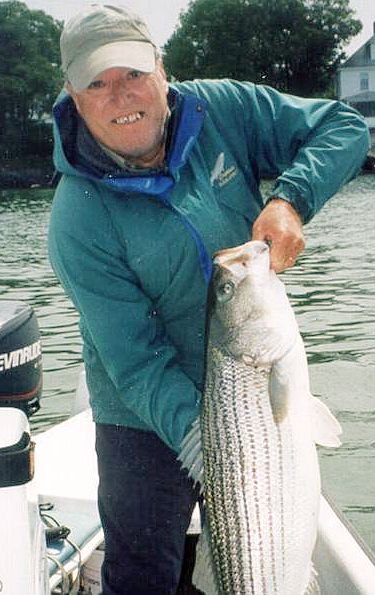
MAINE SUPER, CONSERVATION AGENCY ON ITS WAY TO REALITY?
SALTWATER LICENSE MAY LEAD TO IMPROVED STRIPED BASS FISHING.
Proposed Maine Legislative documents LD 210 and 308 might be the beginning of an effort to combine the Department of Inland Fisheries and Wildlife and the Department of Marine Resources (DMR) into one super agency of conservation.
The LD 308 summary reads as follows: “This bill repeals the Maine Revised Statutes, Title 12, section 6312 establishing the saltwater recreational fishing registry and Title 12, section 6032 establishing the Marine Recreation Fishing Conservation and Management Fund and does the following.
It provides for voluntary saltwater recreational fishing registration.
It directs the Commissioner of Marine Resources to work with the Commissioner of Inland Fisheries and Wildlife to establish a system that allows a person to register on the voluntary saltwater fishing registry online, by checking a box on a freshwater fishing license or watercraft registration or by mailing in a postcard distributed by the departments.
It prohibits the establishment of a fee for registering on the saltwater recreational fishing registry and directs the Commissioner of Marine Resources and the Commissioner of Inland Fisheries and Wildlife to administer the saltwater recreational fishing registry within the departments' existing resources.”
Sponsor of the LD 308 is Representative Jonathan McKane and co sponsors are: Rep. Chipman of Portland, Rep. Olsen of Phippsburg, Rep. Prescott of Topsham, Sen. Snowe-Mello of Androscoggin, Rep Tilton of Harrington and Sen. Trahan of Lincoln.
Another Bill, LD 210 sponsored by Senator Trahan of Lincoln is about the same concept and reads as follows: “This bill repeals the laws that established the current saltwater recreational fishing registry and the Marine Recreation Fishing Conservation and Management Fund and does the following.
1. It establishes a saltwater recreational fishing registry under the jurisdiction of the Department of Inland Fisheries and Wildlife.
2. It directs the Commissioner of Inland Fisheries and Wildlife to establish a registry system that allows a person to register online, through an agent or in conjunction with the purchase of a freshwater fishing license.
3. It provides that a fee or online system fee, and in most cases an agent fee, may not be charged to a person registering on the registry.
4. It requires the Commissioner of Inland Fisheries and Wildlife to administer the saltwater recreational fishing registry within the department's existing resources and provides that the Commissioner of Inland Fisheries and Wildlife and the Commissioner of Marine Resources may not expand enforcement activities regarding the registry beyond existing department resources unless federal funding is secured to cover the costs of those expanded enforcement operations.”
The Bill is cosponsored by: Representative CLARK of Millinocket
Senator COLLINS of York
Senator LANGLEY of Hancock
Speaker NUTTING of Oakland
President RAYE of Washington
Representative SANDERSON of Chelsea
Senator SCHNEIDER of Penobscot
Senator SNOWE-MELLO of Androscoggin
Representative TILTON of Harrington
It appears that these legislations disguise a step closer to combining at least two state agencies into one. Why would a saltwater permit/license/registry be administered by a fresh water agency? And why would bills pointing to Inland Fisheries and Wildlife management be assigned to the Legislative Marine Fisheries Committee? Doesn’t make any sense to me. Mix apple juice with orange juice and you don’t get citrus juice.
I am one of the first to admit that Maine’s current saltwater registry law is a convoluted system that needs change. My solution is to have a real saltwater fishing license, controlled and administrated by a real saltwater agency – DMR – and use the funds to enhance Maine’s valuable, recreational, saltwater fisheries. No money coming into DMR means NO Enforcement, NO Enhancement, NO Future.
Maine’s Department of Inland Fisheries and Wildlife finances its operation by selling license to hunt, fish, trap, and registers numerous machines used in the outdoors. Maine’s Department of Marine Resources is expected to address recreational saltwater issues with no internal funding mechanism. So, it must use commercial funds to do anything for the recreational community under its jurisdiction. I don’t think the commercial fishing community wants its money being used on recreational issues!
The old adage, if it costs nothing you get nothing in return is most appropriate to LD’s 210 and 308. People should contact their legislators to appose these bills if they want Maine to have a future on our coastal shores, especially the valuable striped bass fishery.
Ever wonder how the Sportsman’s Alliance of Maine might feel about one super conservation agency? Call and ask them. If they support these two legislative bills we may be seeing the beginning of the end to two separate conservation agencies, one for inland and one for coastal. Maine – “TheWay Life Should Be” – should have good fisheries management to support that motto. A real saltwater fishing license will help to establish good marine fisheries programs.

